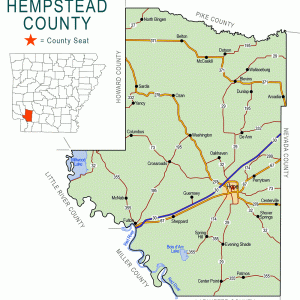calsfoundation@cals.org
Bingen (Hempstead County)
An unincorporated community in Mine Creek Township, Bingen (Hempstead County) is located about four miles northeast of Nashville (Howard County) and about twenty-seven miles northwest of Hope (Hempstead County). The growth and early history of the community are closely tied to Dr. J. R. Wolff.
The original name of the community was Ozan, not to be confused with the town of the same name located about nine miles to the southeast. A post office opened in the community in 1852. A name change was suggested by South Carolina native Wolff, who moved to the area around 1859. Wolff’s grandfather was a native of Germany, inspiring the community to be named around 1881 for Bingen am Rhein, located in Rhineland-Palatinate, Germany. Trained as a physician, Wolff established a medical practice in Bingen but quickly branched out into other businesses.
In 1889, the community included a number of businesses, all owned by Wolff, such as a general store, drugstore, grocery store, grist mill, carding mill, and cotton gin. A Baptist church and a Methodist church operated in the community, as did the Bingen Union Academy. Wolff served as the editor of the weekly Bingen Social Visitor newspaper and also operated a printing office. By 1889, he owned more than 2,200 acres of land, and he and his wife, Emma Young Wolff, had eight children. A Presbyterian church operated in community for a period but was not successful and closed.
The Bingen community supported a ban on the sale of liquor in Hempstead County in 1936, with forty-five voters in favor of ceasing sales, while only eighteen supported their continuation. The proposed ban failed countywide by only nine votes. A controversy related to the vote emerged the next year when efforts began to place a liquor store in the community in order to serve the population of Nashville, where the sale of alcohol was banned. A community meeting held in Bingen led to an organized response in opposition to the store. The plans for a liquor store in the community were abandoned.
The Bingen-Ozan Cemetery located north of the community preserves the original name of Bingen and holds marked graves dating to 1860. The Ebenezer Cemetery is located north of the community and contains marked graves dating to 1896. Located near the Bingen Methodist Church, the Pine Grove Cemetery contains marked graves dating to 1852. J. R. Wolff, his wife Emma, and several members of the Wolff family are buried in that cemetery.
A number of schools operated at Bingen beginning in the late nineteenth century. The Methodists founded a school in the community in 1878. In the early 1880s, the Baptists opened a school in the community. Both schools served the surrounding community, as well as students from nearby towns who boarded. The Methodist school burned during the 1886–87 academic year. The following year, the Methodist and Baptist schools merged and formed the Bingen Union Academy. (Another source places the first year of operation for the academy as 1880.) This school building served the community until 1927, when it was replaced by a newer structure.
The Bingen School District consolidated with Nashville in 1930. An elementary school that included students through the eighth grade continued to operate in Bingen during this time, but it closed in 1956.
Wolff Store, a general store, operated in the community for more than a century, remaining in the Wolff family during the entirety of its operation. The post office was located in the store until it closed in 1965 and the Nashville post office began to serve the community. The store closed at an unknown date and fell into disrepair. It was purchased and moved to Washington (Hempstead County), where it was restored and is privately owned as part of the Coulter Farmstead.
The Bingen area continues to be centered on agriculture, with cattle and poultry as the two major industries. The Bingen Volunteer Fire Department and the Bingen United Methodist Church are located in the community. The Wolff House, constructed by the Wolff family and restored in the early twenty first century, is also located in the community. The South Bingen Estates housing development is located near the intersection of County Road 27 and U.S. Highway 371. Bingen serves as a bedroom community for nearby towns.
For additional information:
Anderson, Cecil. “Restoring a Landmark.” The Nashville News, June 7, 2012, p. 1. Online at https://swarkansasnews.com/wp-content/uploads/2015/06/2012-06-07.pdf (accessed June 3, 2021).
“Benefit Supper Planned by Bingen RCI.” Hope Star, April 8, 1959, p. 1.
“Bingen Named for Old German Town.” Hope Star, June 26, 1936, p. 41.
Biographical and Historical Memoirs of Southern Arkansas. Chicago: Goodspeed Publishing, 1890.
“Graduation at Bingen School on Friday Night.” Hope Star, May 17, 1956, p. 1.
Leslie, Reuben, Sr. “Bingen, My Home Town.” http://www.reubenleslie.com/BingenMyHomeTown.htm (accessed June 3, 2021).
“Our Daily Bread.” Hope Star, December 30, 1937, p.1.
“Star Editorial on Bingen Endorsed.” Hope Star, January 3, 1938, p. 1.
“‘Wets’ Nose out ‘Drys’ by Nine Votes.” Hope Star, February 19, 1936, p. 1.
“Wolff General Store.” Coulter Farmstead. https://www.coulterfarmstead.com/wolff-general-store (accessed June 3, 2021).
David Sesser
Henderson State University
 Hempstead County Map
Hempstead County Map 



One should at least mention who saved the Wolff Store. Richard C. Butler III and Jeremy Carroll accomplished what had been deemed impossible and not feasible.